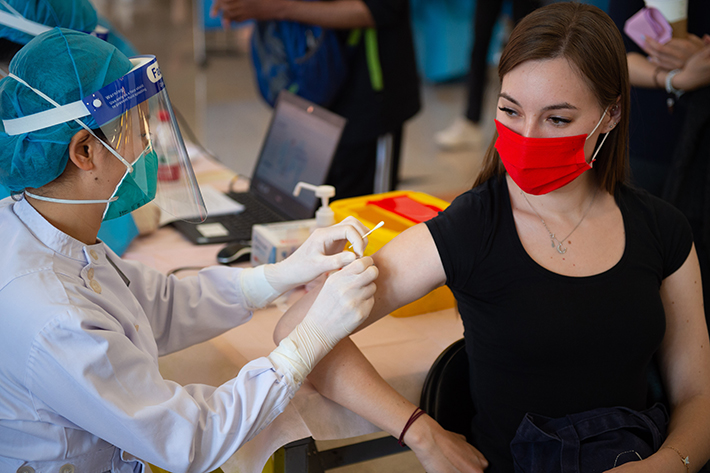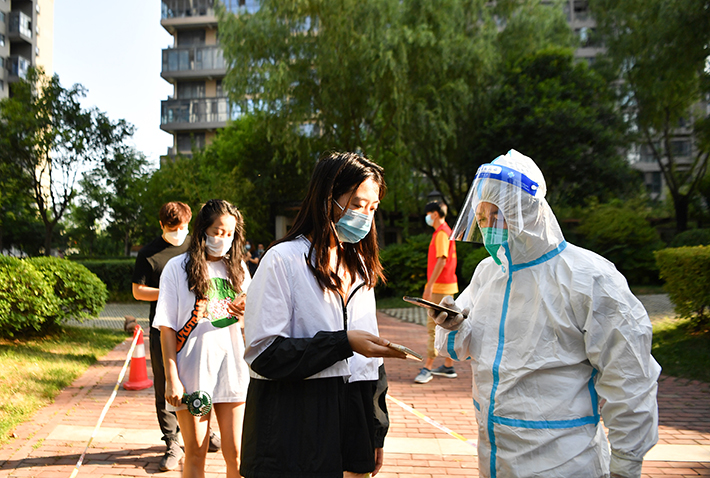|
||||||||||
| Home Nation World Business Opinion Lifestyle ChinAfrica Multimedia Columnists Documents Special Reports |
|
||||||||||
| Home Nation World Business Opinion Lifestyle ChinAfrica Multimedia Columnists Documents Special Reports |
| ChinAfrica |
| Living Through The Pandemic |
| A first-hand account of China’s response to COVID-19 and its effectiveness |
| By Donatien Niyonzima 丨VOL. 15 March 2023 ·2023-03-02 |

A foreign student takes a vaccine shot at Tsinghua University in Beijing, capital of China, on 4 March 2021
After three years of strict anti-COVID-19 restrictions, China has recently relaxed these measures, bringing relief to the entire country. Despite the unquestionable benefits that these restrictions have had from a public health standpoint, they have impacted me in several ways, including socially, emotionally and economically.
For a long period of time, I was unable to travel to my home country, attend international conferences, and pursue other endeavours. However, with the easing of these restrictions, I am now able to make the choice to participate in these activities as I see fit.
When COVID-19 started, many of us around the world did not realise the severity of the situation. In China, where the virus was first identified, there was a feeling that it would be a short-lived epidemic. However, it quickly became a global pandemic that has affected virtually every corner of the world. As a Ph.D. student at the Communication University of China when the pandemic started, I experienced first-hand the impact of the virus on the lives of the people in the country.
Living on campus during the pandemic was both safe and harsh. On the one hand, we were protected from the outside world and had limited exposure to the virus. On the other hand, we were confined to the campus and could not leave for our own safety as well as the safety of others. This experience was shared by many others in China as the country implemented strict measures to control the spread of the virus.
Fake news proliferation
As the pandemic spread around the world, there was a lot going on, especially in the media and on social media. It affected us in many ways, especially as we were under a total lockdown and constantly exposed to news and information that was difficult to authenticate. The impact of fake news and disinformation during the pandemic has been widely reported, and it has made it difficult for people to know what to believe or who to trust.
The pandemic has had a significant impact on media consumption patterns as well. According to the Reuters Institute Digital News Report 2021, the number of people turning to social media as their primary news source has increased. This trend was particularly evident in the early stages of the pandemic when social media was the most popular source of information for people seeking updates on the virus. However, social media was also responsible for spreading disinformation, which made it difficult for people to separate fact from fiction.
The proliferation of fake news and disinformation has been a major challenge for governments worldwide. It’s impressive how the Chinese government has been proactive in combating disinformation related to COVID-19. I have witnessed the way the government has implemented several measures to counter the spread of disinformation, including the establishment of task forces to monitor and take action against fake news.
The Chinese government has also launched a campaign to promote media literacy, which aims to equip people with the skills and knowledge necessary to distinguish between accurate and false information. The government has worked closely with media organisations and technology companies to develop and distribute educational materials on media literacy.

A volunteer at a nucleic acid test site in Xi’an, Shaanxi Province, registers resident information with a mobile phone on 8 July 2022
Prevention at home and abroad
One of the positive experiences during the pandemic was the development of vaccines, including the Chinese vaccines. As a resident in China, I had access to the vaccine early on and I received all three required shots to become fully immunised. The vaccine has been critical in helping to control the spread of the virus, and it has been a welcome relief for those who have been living in fear of the virus for so long. The Chinese government has been working hard to promote vaccination uptake across the country.
The government has implemented a comprehensive vaccination programme, which has been one of the most successful in the world. The vaccination campaign has been a crucial factor in keeping the number of COVID-19 cases in China low.
Apart from promoting vaccination in China, the Chinese government has also been active in supporting other countries’ efforts to combat COVID-19. In Africa, for example, the Chinese government has provided medical assistance and donated COVID-19 vaccines to most African countries. The Chinese government has also launched plans to strengthen health cooperation between China and Africa.
Once I graduated and started working in Beijing in December 2021, the whole country was still following strict measures of COVID-19 protection, which demonstrated how China values people’s lives.
China’s success in controlling the spread of COVID-19 has been recognised globally. The World Health Organisation (WHO) has praised China’s efforts in combating the pandemic. Tedros Adhanom Ghebreyesus, director general of WHO, has said, “China’s efforts to contain the outbreak at its source have been successful, and I believe that China is actually setting a new standard for outbreak response.”
China’s success in controlling the spread of the virus can be attributed to a number of factors such as the speed and decisiveness with which the Chinese government responded to the outbreak. Another factor that contributed to China’s success in controlling the spread of the virus was the use of technology. China’s sophisticated technology infrastructure allowed for effective contact tracing and monitoring of the spread of the virus. The use of technology also enabled the government to communicate quickly and effectively with the public, disseminating information about the virus and the measures being taken to control it.
China’s role in the global response to the pandemic has been the subject of much discussion and debate. Some have praised China for its contributions to the global response, while others have criticised the country for what they see as attempts to use the pandemic to expand its global influence.
Despite the controversies surrounding China’s role in the global response to the pandemic, it is clear that the country has played an important role in the fight against the virus. China’s experience in controlling the spread of the virus, as well as its technological capabilities and manufacturing capacity, have allowed it to make significant contributions to the global effort to combat the pandemic.
Looking ahead, it is clear that the impact of the pandemic will be felt for years to come. The pandemic has exposed weaknesses in healthcare systems around the world, and has highlighted the need for greater international cooperation and coordination in responding to global health crises.
| About Us | Contact Us | Advertise with Us | Subscribe |
| Copyright Beijing Review All rights reserved 京ICP备08005356号-5 京公网安备110102005860号 |